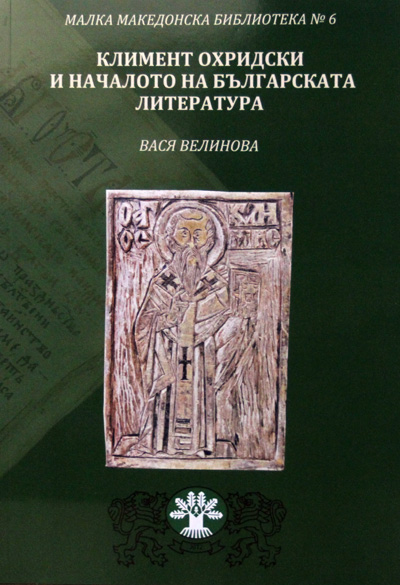Last year we marked the 1,100 death anniversary of St. Clement of Ohrid, a student of Slavonic enlighteners St. St. Cyril and Methodius. A new book about this great person had its premiere at the Regional Museum of History in Sofia: it is named Clement of Ohrid and the Beginning of Bulgarian Literature. It is written by Prof. Vasya Velinova, head of the Prof. Ivan Duichev Center for Slavonic-Byzantine Studies with the Sofia University St. Kliment Orhidski. The book was presented by Associate Prof. Georgi Nikolov, deputy dean of the university history department. It came as a result of years’ long efforts of research and its author hopes that the book will reach great audience.
 “St. Clement of Ohrid is the main reason for this literature conversation in Bulgarian that we are having today, alongside our beautiful Bulgarian poetry, the Bulgarian cinema and dramaturgy as well,” says Prof. Velinova. “It is the basis of our literary language, of Bulgaria’s artistic speech. It creates this taste for poetry, for fiction which is the main thing about any good literature activity. That is why the name of St. Clement has been immortalized. When one sees the countless transcripts of his works, even over the Renaissance period only because of the name signed below, he or she realizes that this means nothing else but talent. Furthermore: Clement of Ohrid was a Old-Bulgarian writer. I do avoid the term ‘Slavonic’, because it is not concrete enough. The deed of St. Clement blossomed in Bulgaria and the Old Bulgarian language lied in the basis of church services, turning into the third major sacral service language in Medieval Europe. This is the feat not only of Clement and the students of the Holy Brothers Cyril and Methodius, but also of Bulgarian rulers Prince Boris and Tsar Simeon who do deserve our admiration and respect. In the 9th century the rulers of Bulgaria realized that the state couldn’t be prosperous without its own letters and culture, alongside its education in Christian culture and ethics.”
“St. Clement of Ohrid is the main reason for this literature conversation in Bulgarian that we are having today, alongside our beautiful Bulgarian poetry, the Bulgarian cinema and dramaturgy as well,” says Prof. Velinova. “It is the basis of our literary language, of Bulgaria’s artistic speech. It creates this taste for poetry, for fiction which is the main thing about any good literature activity. That is why the name of St. Clement has been immortalized. When one sees the countless transcripts of his works, even over the Renaissance period only because of the name signed below, he or she realizes that this means nothing else but talent. Furthermore: Clement of Ohrid was a Old-Bulgarian writer. I do avoid the term ‘Slavonic’, because it is not concrete enough. The deed of St. Clement blossomed in Bulgaria and the Old Bulgarian language lied in the basis of church services, turning into the third major sacral service language in Medieval Europe. This is the feat not only of Clement and the students of the Holy Brothers Cyril and Methodius, but also of Bulgarian rulers Prince Boris and Tsar Simeon who do deserve our admiration and respect. In the 9th century the rulers of Bulgaria realized that the state couldn’t be prosperous without its own letters and culture, alongside its education in Christian culture and ethics.”
We will only add that Prof. Velinova has defended her thesis named Compositional and Stylistic Principles in Clement of Ohrid’s Hail Words under the supervision of prominent scholar Krasimir Stanchev, one of the best experts in Clement’s works.
“The name of St. Clement is really unifying,” Vasya Velinova points out. “Now, upon my return to this issue, so many years after my thesis I realized he was an eternal subject in science. I also found out that each generation of researchers discovers its problems, solves those, sometimes in a brilliant manner, thus enriching its image and our knowledge of the epoch. Of course, the research should be fair. To avoid excessive talk, I would simply like to thank the Macedonian Scientific Institute for the possibility to enter this glorious series with the book, devoted to Saint Clement.”
The edition is the 6th book of the Small Macedonian Library series of the Bulgarian Society of Clans from Macedonia.
English version: Zhivko Stanchev
Almost 40 years ago, Bulgarian Orthodox Church communities were established in Western and Central Europe in several cities - Budapest, Munich, Vienna, Stockholm, Malmö, Oslo and Paris. With Bulgaria's accession to the European Union and the expansion..
On February 4, Blagoevgrad will commemorate the 153rd anniversary of the birth of Bulgarian revolutionary Gotse Delchev with a wreath-laying ceremony. The ceremony will take place at 11am in front of the hero's monument on Macedonia Square. Voivode..
In 2024, the National History Museum sent expeditions to 22 archaeological sites. More than 1,400 artifacts were found during the season spanning the period from prehistoric times down to the Middle Ages. The most significant of these discoveries are..
Meatfare Sunday in 2025 will be remembered as a major celebration for the Bulgarian Orthodox Church and the entire Bulgarian community in the United..

+359 2 9336 661
